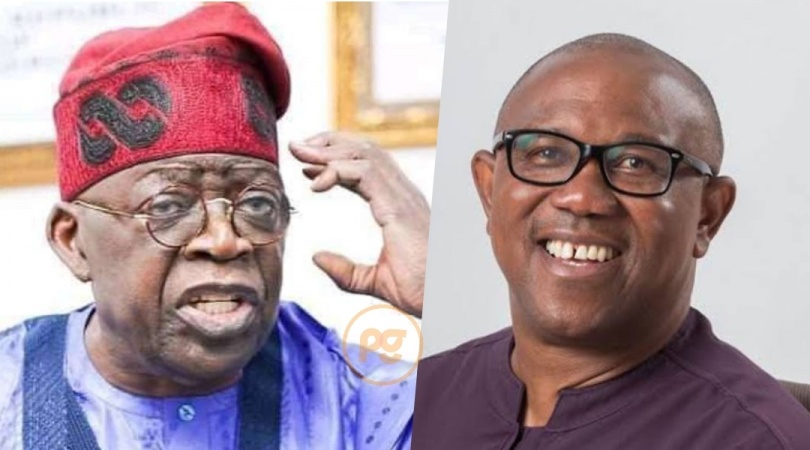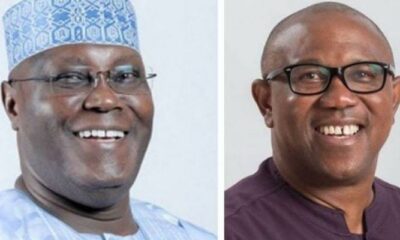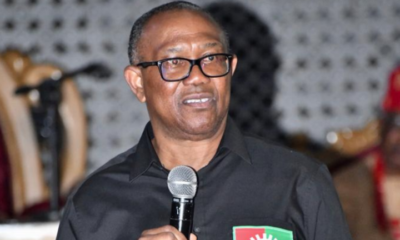Latest News
Is Peter Obi an Agbadoist?

By Pita Agbese
Peter Obi, Labor Party’s presidential candidate, positions himself and he is touted by his supporters as a fundamentally different kind of a Nigerian politician. He touts his “competence”, frugality, incorruptibility, and smartness. From the mouths of his supporters, Obi is the only one who can save Nigeria. Even though he is a 61 year-old man, he is presented as a young, agile, vibrant, and healthful candidate whose only vice is his desperation to save Nigeria.
Obi has finally released his manifesto for the forthcoming presidential election. It is a 72-page document stylishly-produced with many glossy pictures. As is to be expected of Obi, the document is long on rhetorics and short on actionable specifics. Despite its lofty rhetorics, in specific terms, Obi’s manifesto looks like any manifesto that a typical Nigerian politician would put out.
Although I have read the entire document, my main interest was the short section on national security. I was drawn to this particular section for several reasons. First, Obi had vowed that even if “a gun was put on [his] head” (sic), he would not reveal his national security strategy. When Obi made that statement, it was simply a bravado to create the impression that he knew the solution to the country’s security problems, but that he would not reveal it lest his opponents commander it as their own. I suspected then that Obi had not really thought much about a national security strategy. I was curious to find out how Obi would issue a campaign manifesto and leave out, probably, the most important issue in the 2023 presidential election. Well, no gun was put on Obi’s head and Obi did volunteer his national security strategy. Now, we know what that strategy consists of. Second, national and international security is my strong suit and I knew I could analyze this issue more than any other issue in the manifesto.
Disappointingly, Obi’s national security plan is one of the shortest segments of the manifesto. It does not even include the glossy pictures of the other segments of the manifesto. It does contain three grainy and out of focus pictures of a military parade and the police holding rifles. The segment contains egregious typographical errors characteristic of a document put together in a hurry. It does not reflect the touted competence of Peter Obi. Let me restate verbatim the major segment of the manifesto containing how Obi plans to secure Nigeria. The manifesto says,
“To secure Nigeria, we will:
I. Deal decisively with insecurity by putting a permanent end to the incessant banditry, insurgency, kidnaping and cross-border terrorism in our country today.
II. To achieve this we shall take the following immediate actions:
a.Activate all the necessary regional cooperation and arrangements for securing our borders with neighboring countries in west (sic) and central (sic)Africa, particularly Niger,Chad,andCameroun;
b. Increase the personnel of our armed forces, police and other security agencies and optimally equipp (sic), train, and fund them to respond adequately to security threats;
c. Deploy state-of-the-art military technology to fight terrorists, bandits, insurgents and kidnappers;
d.Recreate community relations with security agencies in order to increase public trust and build human intelligence to restore law and order in the communities.
III. Pursue proactively and deliberately policies that will implement the fundamental objectives and directive principles of state police (sic) in the constitution so as to create a secured society that reduces the social pressure for crimes and provides viable livelihood for the youths.”
The segment on national security emphasizes that an Obi administration would “undertake institutional reforms to secure Nigeria.” It outlines four ways in which this would be done: reform of the security sector geared to giving the police greater responsibility on “internal security threats and law enforcement. The military would be re-focused (sic) on external security threats. The manifesto promises to end impunity through “swift, firm and fair prosecution of criminals, bandits and terrorists.” It also promises “enhanced coordination among security agencies.” The manifesto’s fourth initiative is a commitment to a “fair and transparent administration of justice hinged on the rule of law.”
Improving how well and how effectively the security agencies, including the police, function is another promise enunciated by the manifesto. It promises that an Obi administration would also strengthen the oversight functions of relevant ministries to enhance coordination and performance of the security services. The segment ends by promising to protect “every Nigerian life at all cost” (sic).
Those eager to know how Obi would actually with threats to national security would not find much beyond the buzzwords and the sound bites of the manifesto. Let me dissect one of the sound bites to show the hollowness of the Obi/Datti plan on national security. The manifesto promises to deploy “the state-of-the-art military technology to fight terrorists, bandits, insurgents and kidnappers.” The state of the art in warplane technology is the American F-35. This plane costs $110 million to purchase. It costs $36,000 per operational hour and its maintenance cost over its 66 year life span is an estimated whopping $1.3 trillion. The total defense expenditures of Nigeria in 2020 were only $2.57 billion. At the current BDC exchange rate of the Naira to dollars, these are 8.8 billion Naira to buy, 28.8 million Naira per hour to fly it, and 1,040,000,000,000 Naira to maintain this single plane for its entire life, respectively. The state-of-the-art military drone technology is the Northrop Grumman X-47B. This drone costs $405 million. That is 324 billion Naira.
When APC presidential candidate, Bola Ahmed Tinubu, proposed to significantly increase the number of military personnel as part of his national security strategy, he was derided for the outlandish number and for suggesting that the soldiers could be fed with Agbado. If Obi has his way in purchasing state-of-the-art-art military technology to deal with Nigeria’s national security threats, he would have to sell the entire country to raise the money for the purchase and maintenance of that technology. Well, it looks like Peter Obi, in proposing a substantial increase in military personnel is also an Agbadoist. What is worse, he is proposing a state-of-the art military technology that the entire Nigerian economy cannot afford even if a gun is put on the economy’s head.
























